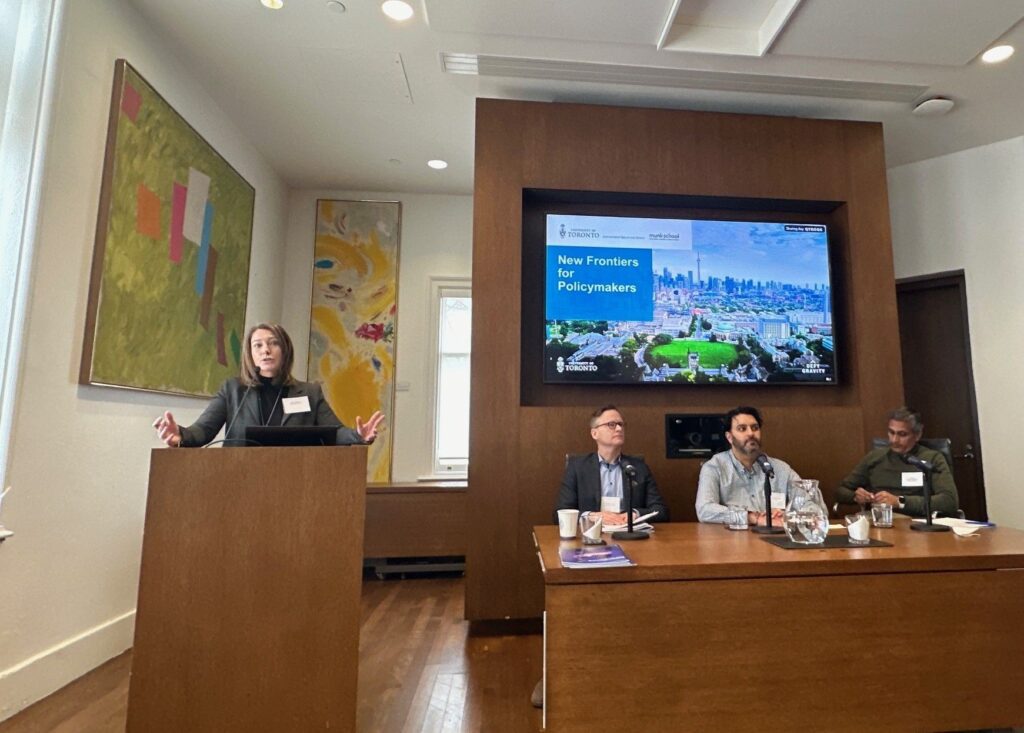Public procurement, talent and capital critical to scaling up

The U of T ecosystem and the talent and networks in the GTA region are a resource to help startups thrive and scale, a forum on the topic heard this month.
“U of T is inarguably a startup creation engine in Ontario. Over the past decade, U of T researchers, clinicians, and students have launched over 650 startups and created 10,000 jobs,” said Leah Cowen, U of T’s vice-president, research and innovation, and strategic initiatives.
“Our researchers are commercializing research at the frontiers of knowledge – from AI and medical devices to legal services and materials discovery. These companies are improving lives, creating jobs, and supporting Ontario’s economic growth.”
Cowen was speaking during an event hosted by the Government Relations Office and Munk School of Global Affairs & Public Policy, discussing how the experience of U of T startups can help inform programs that support companies to grow and scale. While the U of T ecosystem has created some of Ontario’s fastest growing companies, as ranked on lists such as MaRS Momentum and Deloitte Technology Fast 50, Canada faces challenges creating globally leading scaleups.
Shiri Breznitz, Professor and Director of Research, Munk School of Global Affairs & Public Policy, moderated the conversation between startups and innovation leaders.
An expert in the area of entrepreneurship, innovation and technology, Breznitz noted that despite Ontario’s talent, research, and startup generation prowess, challenges such as investments in research & development and competitiveness in export markets are barriers to company growth.
“Achieving scale-up requires a diverse policy approach,” she added.
Several panelists spoke to the supports startups need in order to grow:
Aman Thind co-founded Conavi Medical Inc. after completing his doctorate in medical biophysics at U of T. This Toronto-based medical device company develops, manufactures, and sells technologies that enable minimally invasive cardiac procedures. Their surgery imaging device was developed through research pioneered at U of T and subsequently advanced at Sunnybrook Health Sciences Centre. Today, the firm employs over 50 highly skilled personnel and has trained co-op students and recent graduates.
Deepak Ramachandran completed his undergraduate studies in philosophy and chemistry at U of T and co-founded FundThrough. The firm’s AI-powered invoice funding platform provides financing for small and medium sized businesses. With offices in Toronto and Houston, the firm has grown to almost 100 employees. To meet their talent needs, the firm has hired U of T interns, engineering students completing their Professional Experience Year, and graduates over the years.
Derek Newton, Assistant Vice-President, Innovation, Partnerships and Entrepreneurship, heads the university’s Innovations & Partnerships Office (IPO). IPO is a leader in patenting, filing 75 priority patents applications and executing over 40 licensing and option agreements every year. IPO helps build successful partnerships between industry and U of T’s research community, and also manages the university’s IP portfolio.
Panelists identified several barriers hindering scale-up, as well as steps the University has taken to help firms scale, find customers, and stay in Ontario:
- Procurement: For medical device companies, it is often difficult to get their product into the healthcare system due to regulatory barriers and risk-aversion. By becoming a first or early adopter of home-grown technologies, government and the broader public sector can help local companies grow and stay in Ontario. For example, U of T’s Buy Blue Program enables U of T entities to become the first buyer of products or services developed by new U of T startups at a discounted price.
- Access to capital: It can be challenging for startups to secure sufficient capital in Ontario, prompting many founders to pursue funding opportunities in the U.S. and open U.S. offices. Some of these firms eventually relocate south of the border. For its part, U of T provides founders with exposure to funding and top tier investors through events like Demo Days, over $100,000 in non-dilutive funding awarded each year during Entrepreneurship Week, and the investor-focused Deep Tech Download newsletter.
- Access to resources and networks: Navigating government programs and funding opportunities is challenging for startups. Organizations like MaRS play a valuable role by helping founders identify relevant supports and a path to reach their next milestone. U of T Entrepreneurship’s 12+ Accelerators provides founders across the tri-campus with a variety of supports, including go-to-market strategies, mentorship, networking events, and incubation space.
- Access to a diverse set of skills: Talent is key to ensuring technology firms remain competitive. And for startups looking to scale, hiring individuals who previously scaled a company and possess strong sales and marketing skills is important. To this end, the university’s Startup Job Board helps startups in the U of T community connect with the talent they need to grow.
“In recent years, we’ve seen a growing number of students who want to pursue entrepreneurship as a career path,” Newton said. Accordingly, U of T offers 200 entrepreneurship-related courses, as well as a free Intellectual Property Education Program.
With support from partners, the university is also investing in more spaces for future entrepreneurs, including the Schwartz Reisman Innovation Campus, The Sam Ibrahim Centre for Inclusive Excellence in Entrepreneurship, Innovation and Leadership, and UTM SpinUp – U of T’s first wet lab incubator.
“U of T is committed to seeing these companies survive and thrive. Understanding what drives successful startup growth has huge implications for Ontario and Canada’s economy. This is why we are working to learn from our entrepreneurs and their experiences,” Cowen said.
The conversation will continue with a spring discussion as part of the New Frontiers for Policymakers series hosted by the Government Relations Office and Munk School of Global Affairs & Public Policy. The series promotes dialogue between decisionmakers and U of T researchers on policy areas of shared interest.
(Event Summary by Catrina Kronfli)
